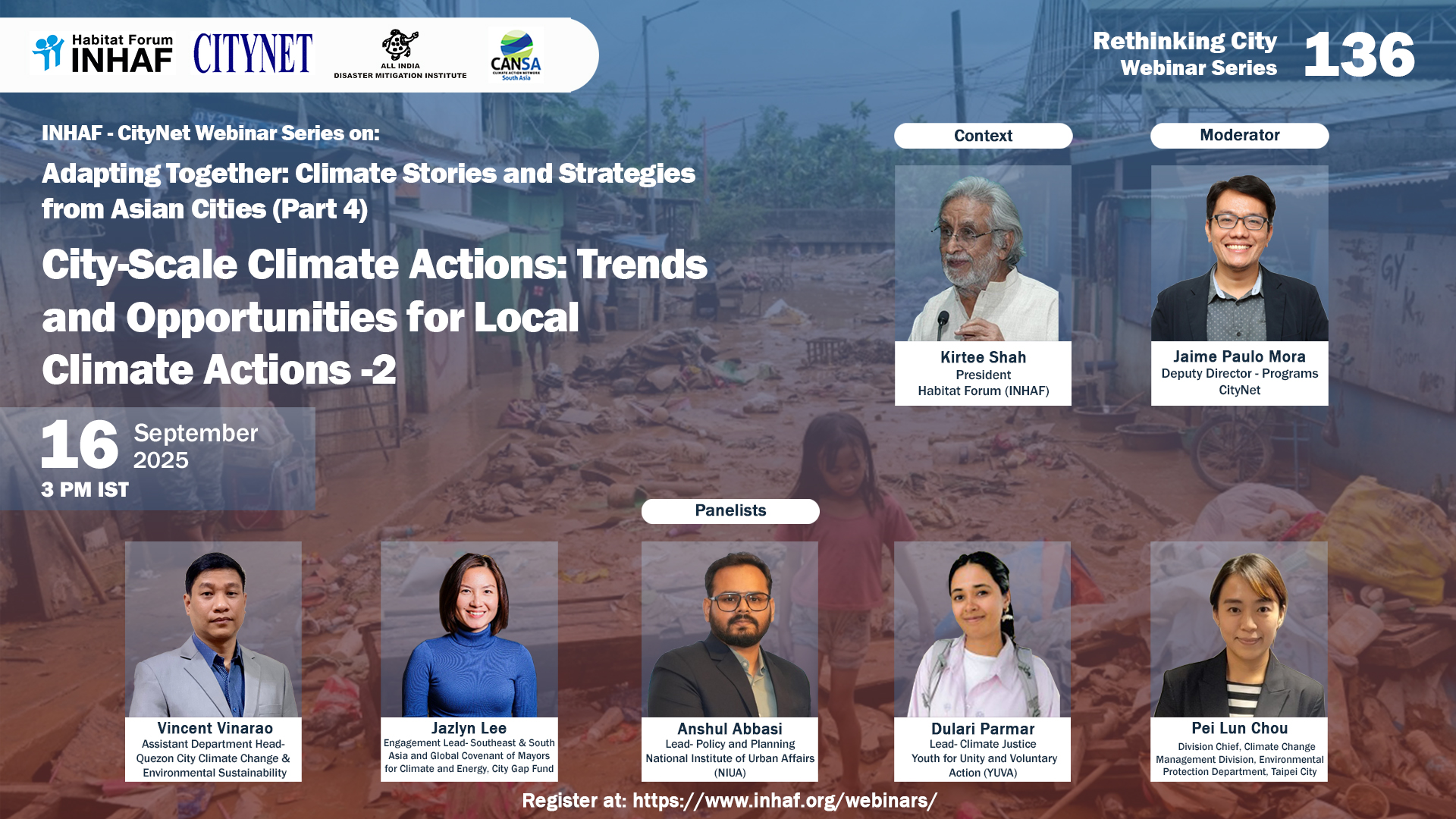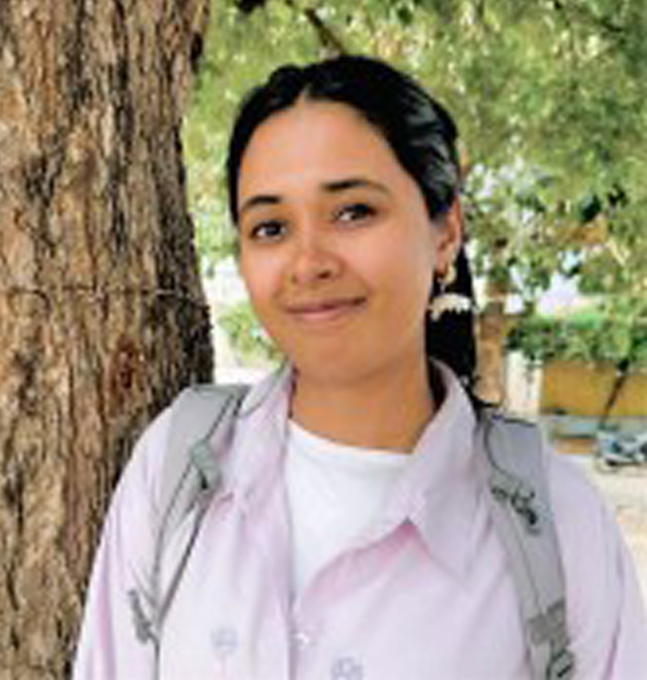
Speakers
-
 Anshul AbbasiLead- Policy and Planning, NIUA
Anshul AbbasiLead- Policy and Planning, NIUAAnshul Abbasi is an urban development professional with over nine years of experience leading transformative climate action initiatives across Indian cities. As Lead – Policy and Planning at the National Institute of Urban Affairs (NIUA), he has played a pivotal role in advancing India’s urban climate agenda.
Abbasi has led the formulation of Climate Action Plans (CAPs) for cities such as Pune, Leh, Junagadh, and Jamnagar, enabling the integration of emissions reduction strategies and climate resilience into local governance systems. He was instrumental in shaping the ClimateSmart Cities Assessment Framework (CSCAF), with a special focus on Urban Planning, Green Cover, and Biodiversity, empowering over 100 cities to evaluate and strengthen their climate performance.
He has made significant contributions to national policy, notably authoring critical sections on low-carbon urbanization and energy-efficient buildings in India’s Long-Term Low Emission Development Strategy (LT-LEDS). He is also a core contributor to the upcoming National Mission on Sustainable Habitat (NMSH) 2.0, designed to mainstream sustainability across more than 4,000 urban local bodies.
Currently, he is leading the development of the Disaster Management Plan (DMP) for the Ministry of Housing and Urban Affairs, integrating climate risk and business continuity frameworks for Indian cities. He is also the architect of the Climate Data Observatory (CDoT), a pioneering platform that democratizes climate data access for cities and stakeholders.
Through his work, he bridges data, policy, and practice to promote sustainable urban transformation and resilient growth, especially in the built environment sector. -
 Dulari ParmarLead- Climate Justice, YUVA
Dulari ParmarLead- Climate Justice, YUVADulari Parmar, is an architect based in Mumbai. She completed her masters degree in Urban Design from Kamla Raheja Vidyanidhi Institute for Architecture and Environmental Studies. At YUVA, she contributes to the climate justice work. Dulari has played a crucial role in the climate hazard mapping of the Mumbai metropolitan region and facilitated the community-driven climate vulnerability assessment in Ambojwadi, Malad. Previously at YUVA, she has also conducted research on the impacts of the urban infrastructure projects on climate and the urban poor in Vasai Virar region. She has currently co-authored an article on Analysis of Mumbai Floods in Recent Years with Croudsourced Data with Interdisplinary Program in Climate Studies, IIT Bombay. Dulari currently supports the climate justice work in Navi Mumbai, Guwahati and Vasai Virar, for city level advocacy on climate justice issues. Through her work she emphasizes the need for the marginalized groups, assserting that this tool can be leveraged by the communities to advocate for their rights.
-
 Jaime Paulo MoraDeputy Director - Programs, CityNet
Jaime Paulo MoraDeputy Director - Programs, CityNetPrior to working in CityNet, Jaime Paulo Mora spent ten years working in a national local government association based in Manila, Philippines. He held various supervisory positions in both regular and foreign-assisted programs and projects that focused on urban development. Some of these include public procurement, disaster risk and resilience, local health development and localizing Millennium Development Goals/Sustainable Development Goals.
He graduated with a journalism degree at the University of Santo Tomas. Paulie has a professional background in development communications, public advocacy, local governance, and urban sociology.
In the Citynet, among other tasks, he manages the Citynet Services Program and provides membership services to Philippines and Fiji Citynet members.
-
 Jazlyn LeeEngagement Lead for Southeast Asia and South Asia Global Covenant of Mayors for Climate and Energy - The City Climate Finance Gap Fund (GCoM-Gap Fund) Partnership
Jazlyn LeeEngagement Lead for Southeast Asia and South Asia Global Covenant of Mayors for Climate and Energy - The City Climate Finance Gap Fund (GCoM-Gap Fund) PartnershipJazlyn leads the city engagement on the City Climate Finance Gap Fund in Southeast Asia and South Asia. She facilitates partnerships and promotes low-carbon and climate resilience actions implementation by cities by supporting cities in improving their access to climate financing and resources from project preparation facilities, such as the Gap Fund.
Jazlyn has previously worked as the consultant and a program officer with the United Nations Office on Drugs and Crime (UNODC) on tackling waste trafficking issue. She also worked at the World Wide Fund for Nature (WWF) as the South-East Asia (SEA) Regional Coordinator for the Extended Producer Responsibility (EPR) project.
-
 Vincent VinaraoAssistant Department Head, Quezon City Climate Change and Environmental Sustainability
Vincent VinaraoAssistant Department Head, Quezon City Climate Change and Environmental SustainabilityVincent Vinarao serves as the Assistant Department Head of the Quezon City Climate Change and Environmental Sustainability Department, where he plays a key role in advancing the city’s environmental programs and climate action agenda. With extensive experience in local governance and sustainability initiatives, he supports the design, implementation, and monitoring of policies and projects that address climate resilience, environmental protection, and sustainable urban development.
His work focuses on strengthening Quezon City’s commitment to achieving its climate goals, fostering cross-sectoral partnerships, and ensuring that community-driven initiatives contribute to a greener, more resilient city.
Local Time
- Timezone: America/New_York
- Date: Sep 16 2025
- Time: 5:30 am
Adapting Together: Climate Stories and Strategies from Asian Cities (Part IV) – City-Scale Climate Actions: Trends and Opportunities for Local Climate Actions -2
About the Webinar Series – Adapting Together: Climate Stories and Strategies from Asian Cities
Habitat Forum (INHAF), a civil society organization and CityNet member from India in collaboration with CityNet, AIDMI, CANSA, is launching a new initiative: a 5-part webinar series on Cities and Climate Change. The series is intended for all those engaged in the field of Urban Development, with the goal of responding to the unique and growing challenges posed by climate change. These challenges call for a rethinking of existing urban systems, practices, and governance mechanisms.
Cities all over the world are being battered by climate impacts such as extreme rainfall and consequent urban flooding. Since Cities contribute around 63% of nations’ GDPs, climate impacts are leading to heavy and repetitive damage and costs. Urban heat islands are posing mounting problems for livability, while spurring calls for increasing blue-green infrastructure in contexts of competing land use. Droughts and wasteful consumption have created crises in water supply in many parts of the world. Several Cities, including among CityNet members are striving to evolve, and implement coping mechanisms while also building systems to create long term resilience to these and other climate impacts.
The world as a whole, and individual nations, are also grappling with the need to reduce greenhouse gas emissions so as to check global warming that drives climate impacts. Besides national targets under the Paris Agreement, sub-national governments, especially Cities, are also being called upon to shoulder a substantial part of the emissions reduction burden, since Cities contribute about 70% of emissions. Cities are approaching these challenges in different ways and could learn a lot from each other about perspectives and practices.
Webinar 4: City-Scale Climate Actions: Trends and Opportunities for Local Climate Actions -2
Focus of this Webinar is on City case studies on climate resilience and mitigation. Presentations will cover management of the urban climate impacts and emissions in both policy and practice, reflecting stakeholders’ participation, sustainable financing, urban governance systems, sub-national capacities and international climate cooperation. The Session will unpack success factors and provide some tips for other cities regarding challenges faced. Presentations will also connect urban climate actions to nationally determined contributions (NDC).

